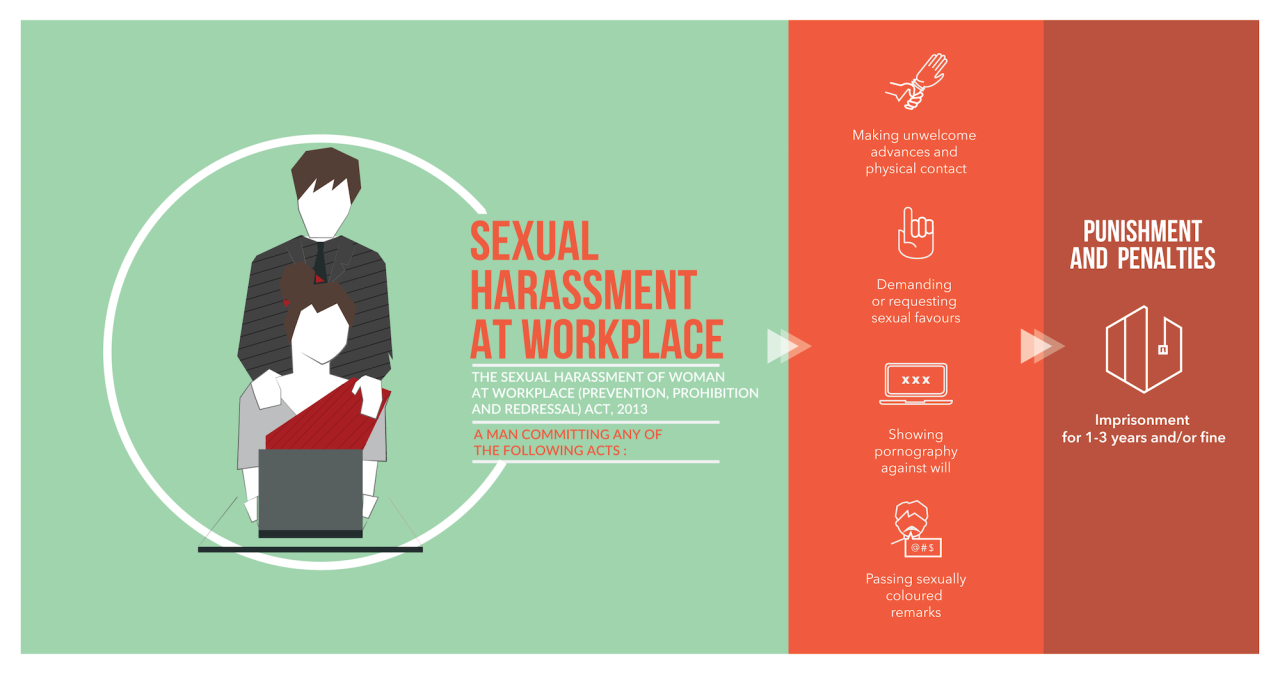Sexual Harassment of Women at the Workplace
As per a recent survey with around 6,074 participants (both male and female) conducted by Indian National Bar Association, around 38 percent respondents confessed to being sexually harassed at the workplace. The same report reveals that around 69 percent respondents decided against complaining to the management. In a shocking state of affairs, 65 percent of the participants revealed that most of the companies did not follow the procedure prescribed under Sexual Harassment (Prevention, Prohibition and Redressal) Act, 2013 (‘the Act’).
In most cases, women tend to not report such instances because either they are scared of the system or the position the harasser holds in the organization. Most of them, due to lack of training, are unaware of what remedies are available.
According to the Sexual Harassment of Women at Workplace (Prevention, Prohibition and Redressal) Act, 2013, any of the following circumstances, if it occurs or is present in relation to or connected with any act or behavior of sexual harassment may amount to sexual harassment:

- Implied or explicit promise of preferential treatment in her employment.
- Implied or explicit threat of detrimental treatment in her employment.
- Interferes with her work or creating an intimidating or offensive or hostile work environment for her.
- Humiliating treatment likely to affect her health or safety.
Sexual harassment includes unwelcome sexually determined behavior such as:
- Physical contact.
- Demand or request for sexual favours.
- Sexually coloured remarks.
- Showing pornography.
- Any other unwelcome physical, verbal or non-verbal conduct of a sexual nature.
Duties and Responsibilities of Employers
Under the Sexual Harassment of Women at Workplace Act, 2013, all employers have the following duties and responsibilities:
- Provide a safe working environment at the workplace which shall include safety from the persons coming into contact at the workplace;
- Display at any conspicuous place in the workplace, the penal consequences of sexual harassment’s; and the order constituting, the Internal Committee under sub-section (1) of section 4 of the Act providing that every employer of a workplace shall, by an order in writing, constitute a Committee to be known as the “Internal Complaints Committee”: Provided that where the offices or administrative units of the workplace are located at different places or divisional or sub-divisional level, the Internal Committee shall be constituted at all administrative units or offices;
- Organize workshops and awareness programmes at regular intervals for sensitising the employees with the provisions of the Act and orientation programmes for the members of the Internal Committee in the manner as may be prescribed;
- Provide necessary facilities to the Internal Committee or the Local Committee, as the case may be, for dealing with the complaint and conducting an enquiry;
- Assist in securing the attendance of respondent and witnesses before the Internal Committee or the Local Committee, as the case may be;
- Make available such information to the Internal Committee or the Local Committee, as the case may be, as it may require having regard to the complaint made under sub-section (1) of section 9;
- Provide assistance to the woman if she so chooses to file a complaint in relation to the offence under the Indian Penal Code or any other law for the time being in force;
- Cause to initiate action, under the Indian Penal Code, 1860 or any other law for the time being in force, against the perpetrator, or if the aggrieved woman so desires, where the perpetrator is not an employee, in the workplace at which the incident of sexual harassment took place;
- Treat sexual harassment as a misconduct under the service rules and initiate action for such misconduct;
- Monitor the timely submission of reports by the Internal Committee.

Formation of Internal Complaint Committee
Under the Sexual Harassment of Women at Workplace (Prevention, Prohibition and Redressal) Act, 2013, all employers are required to constitute an Internal Compliant Committee at a workplace by an order in writing. In case the employer has multiple branches or factories or offices, an Internal Committee must be constituted at all administrative units or offices.
The Internal Committee must consist of the following members, nominated by the employer:
- A Presiding Officer who shall be a woman employed at a senior level at workplace from amongst the employees.
- Not less than two Members from amongst employees preferably committed to the cause of women or who have had experience in social work or have legal knowledge.
- One member from amongst non-governmental organisations or associations committed to the cause of women or a person familiar with the issues relating to sexual harassment.
The Internal Complaint Committee must have at least one-half of the total Members as women at all times. The Presiding Officer and every Member of the Internal Committee can hold office for a period not exceeding three years, from the date of their nomination.
Powers of Internal Complaint Committee
An Internal Compliant Committee constituted under the Sexual Harassment of Women at Workplace (Prevention, Prohibition and Redressal) Act, 2013 will have the same powers as vested in a Civil Court under the Code of Civil Procedure, 1908 when trying a suit in respect of the following matters:
- Summoning and enforcing the attendance of any person and examining him on oath.
- Requiring the discovery and production of documents.
- Any other matter which may be prescribed.
The Internal Compliant Committee could recommend to the employer, the following actions:
- Grant such other relief to the aggrieved woman as may be prescribed.
- Transfer the aggrieved woman or the respondent to any other workplace.
- Grant leave to the aggrieved woman upto a period of three months.
Procedure for Filing Compliant
A complaint on sexual harassment at the workplace must be made by the aggrieved woman within a period of three months from the date of occurrence of an incident. In case of a series of an incident, within a period of three months from the date of last incident.
The complaint must be made in writing and submitted to the Internal Complaint Committee and be sent either by post or given in person. The Internal Complaint Committee also has the powers to extend the time-limit for reporting by not more than three months, if it is satisfied that the circumstances were such which prevented the employee from filing a complaint within the three month period.
If an aggrieved woman is unable to make a written complaint by herself on account of her physical incapacity, a complaint can be filed by:
- Her relative or friend.
- Her co-worker.
- An officer of the National Commission for Women or State Women’s Commission.
- Any person who has knowledge of the incident, with the written consent of the aggrieved woman.
If an aggrieved woman is unable to make a written complaint by herself on account of her mental incapacity, a complaint can be filed by:
- Her relative or friend.
- A special educator.
- A qualified psychiatrist or psychologist.
- The guardian or authority under whose care she is receiving treatment or care.
- Any person who has knowledge of the incident jointly with her relative or friend or a special education or qualified psychiatrist or psychologist or guardian or authority under whose care she is receiving treatment or care.
Finally, if an aggrieved woman is unable to make a written complaint by herself on account of her mental incapacity or physical incapacity or death, a complaint can be filed by her legal heir.

1. You are covered under the act if you are an employee (part-time, full-time or an intern)
The Act is designed to recognize and provide for every woman access to the safe and secure work environment as a matter of right. It has been diligently ensured that each woman gets this right, irrespective of her age, employment or work status.
Thus, a woman who is either working or visiting any workplace on a regular, temporary, ad-hoc or daily wage basis, is covered under the Act. In fact, the definition of “aggrieved woman” as per Section 2(a)(i) states that in relation to a workplace, an aggrieved woman would mean a woman “whether employed or not” who alleges to have been subjected to harassment. This has expanded the horizon to all women whether engaged directly or indirectly or through an agent, including a contractor, a visiting client. or even an intern, with or without the knowledge of a principal employer. It does not matter if the woman is working at a dwelling place; she is also covered under the Act.
In short, a woman associated with any organisation, firm, NGO or even a dwelling is entitled to be protected under the Act. However, the formation of the Internal Complaints Committee is subject to the number of employees (irrespective of gender). There have to be at least 10 employees in the company or a branch of the company for the formation of the Internal Complaints Committee.
- Recognizing sexual harassment
In most of the cases, harassment occurs in the most unexpected way. It starts with moves that appear to be innocent but ends up in unprofessional and inappropriate behavior. As a key pointer, you need to understand that anything that appears to be sexual, unpleasant and inappropriate, which may or may not be within your tolerance limits, amounts to sexual harassment.
Sexual harassment at the workplace can include any of the following instances:
- Physical contact or advances
- A demand or request for sexual favours
- Sexually coloured remarks
- Showing pornography
- Any other unwelcome physical, verbal or non-verbal conduct of sexual nature.
Any of these instances or the following behaviors, on the pretext of above-mentioned instances, would also amount to sexual harassment :
(i) the implied or explicit promise of preferential treatment in your employment; or
(ii) implied or explicit threat of detrimental treatment in your employment; or
(iii) implied or explicit threat about your present or future employment status; or
(iv) interference with your work or creating an intimidating or offensive or hostile work environment for you; or
(v) humiliating treatment likely to affect your health or safety.
This means, at any point of time, if you or anyone you know is being coerced into providing unsolicited favors, you should ensure that strict action is taken against that person.
- When and where to complain?
In case of an incident of sexual harassment, you are required to complain, in writing, to the Internal Committee or – in its absence – to the Local Committee in your area.
A complaint can be filed within three months from the date of offence being committed. In case there has been a series of such instances, then, within three months of the last time such offence was committed. In case of unavoidable circumstances, if you have not been able to lodge a complaint, the ICC and the Local Committee have been empowered to extend the time limit for another three months, in writing. However, it is advisable to ensure that the complaint is filed as soon as such an instance takes place.
Moreover, it is also mandated by the Act, that if the complaint cannot be filed in writing, it is imperative for the committee or the Presiding Officer to provide all the required assistance to ensure the complaint is written and duly filed. In case the aggrieved woman cannot register the complaint due to physical/mental incapacity, or death, her legal heir or any such person can also lodge a complaint under the provisions of the Act.
- You can request for leave or transfer to a different branch
When you file a complaint, your Internal Committee is required to make a quick inquiry into the matter as per the procedure mentioned in your company’s sexual harassment policy. However, in case the Internal Committee does not exist or it is a case of domestic help, the Local Committee will forward the complaint to the police within seven days from the registration of complaint.

However, under such circumstances it is very likely that you might not want to go to work and face the same people. To avoid such issues you can claim relief under Section 12 of the Act. On a written request to the Internal Committee, you can ask them to direct your employer to:
(a) seek yours or the respondent’s transfer to any other branch; or
(b) grant you leave up to a period of three months; or
© grant such other relief to you as may be prescribed under the Act.
The leave granted to you under the Act shall be in addition to the leave you would be otherwise entitled to.
5 The Internal Committee Can Recommend Deduction Of Salary Of The Accused (If Offence Is Proved)
It is beyond anyone’s comprehension to understand the agony of a woman during this rigmarole. To even compensate for it is out of the question. However, the Act tries to make a certain attempt at providing compensation to the aggrieved person. The Act provides for deducting compensation from the salary of the respondent in case the offence is proved. In case the salary of the respondent is not sufficient, then he is made liable to pay on his own account. In absence of that, the Internal Committee has the authority to send the order to the district officer to recover the amount as arrears of land revenue.
You can seek the determination of compensation for the following:
(a) the mental trauma, pain, suffering and emotional distress caused;
(b) the loss in the career opportunity due to the incident;
© medical expenses incurred by you for physical or psychiatric treatment;
(d) the income and financial status of the respondent; and
(e) feasibility of such payment in lump sum or in installments.

Comments
Post a Comment